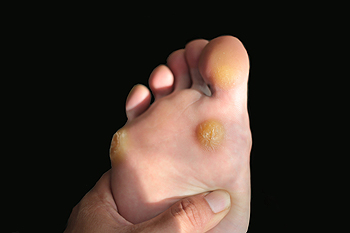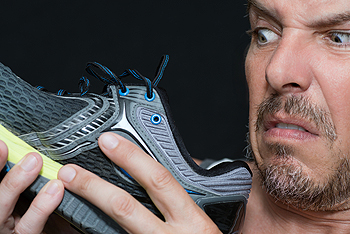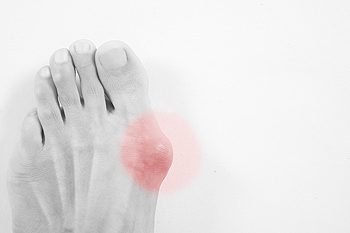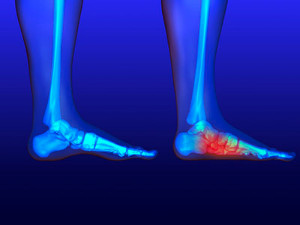
 While similar to a callus, corns are harder, smaller, and generally more painful thickened layers of the skin that appear as small lumps on the feet and toes. Typically caused by irritation and friction, corns can be incredibly uncomfortable to deal with if left untreated. To avoid getting a corn, it’s recommended that you wear footwear that gives your toes room to move freely in, you keep your feet clean and moisturized, and you keep your toenails properly trimmed. To help treat corns, it’s often advised that you soak your feet in warm water before filing at it with a pumice stone. Moisturizing after filing and using corn pads may also help to reduce your corn. If your corn is extremely painful, causing swelling, redness, or drainage of pus, we recommend that you consult with a podiatrist as soon as possible for professional care and treatment.
While similar to a callus, corns are harder, smaller, and generally more painful thickened layers of the skin that appear as small lumps on the feet and toes. Typically caused by irritation and friction, corns can be incredibly uncomfortable to deal with if left untreated. To avoid getting a corn, it’s recommended that you wear footwear that gives your toes room to move freely in, you keep your feet clean and moisturized, and you keep your toenails properly trimmed. To help treat corns, it’s often advised that you soak your feet in warm water before filing at it with a pumice stone. Moisturizing after filing and using corn pads may also help to reduce your corn. If your corn is extremely painful, causing swelling, redness, or drainage of pus, we recommend that you consult with a podiatrist as soon as possible for professional care and treatment.
If you have any concerns regarding your feet and ankles, contact one of our podiatrists of Achilles Foot Clinic. Our doctors will treat your foot and ankle needs.
Corns: What Are They? and How Do You Get Rid of Them?
Corns can be described as areas of the skin that have thickened to the point of becoming painful or irritating. They are often layers and layers of the skin that have become dry and rough, and are normally smaller than calluses.
Ways to Prevent Corns
There are many ways to get rid of painful corns such as wearing:
Treating Corns
Treatment of corns involves removing the dead skin that has built up in the specific area of the foot. Consult with Our doctors to determine the best treatment option for your case of corns.
If you have any questions, please feel free to contact one our office, located in the South of Calgary, Alberta. We offer the newest diagnostic and treatment technologies for all your foot care needs.
 Patients who have excessively sweaty feet may have a condition that is referred to as plantar hyperhidrosis. It may be caused by genetic factors, in addition to extreme emotional or physical stress. This condition may be treated by wearing inner soles that are absorbent, and the feet may feel better while using powders that can absorb the sweat. Additionally, it may help to change socks frequently, which may be beneficial in preventing an infection. If you are suffering from sweaty feet, it is advised that you seek the counsel of a podiatrist who can help you find the right treatment method.
Patients who have excessively sweaty feet may have a condition that is referred to as plantar hyperhidrosis. It may be caused by genetic factors, in addition to extreme emotional or physical stress. This condition may be treated by wearing inner soles that are absorbent, and the feet may feel better while using powders that can absorb the sweat. Additionally, it may help to change socks frequently, which may be beneficial in preventing an infection. If you are suffering from sweaty feet, it is advised that you seek the counsel of a podiatrist who can help you find the right treatment method.
If you are suffering from hyperhidrosis contact one of our podiatrists of Achilles Foot Clinic. Our doctors can provide the care you need to attend to all of your foot and ankle needs.
Hyperhidrosis of the Feet
Hyperhidrosis is a rare disorder that can cause people to have excessive sweating of their feet. This can usually occur all on its own without rigorous activity involved. People who suffer from hyperhidrosis may also experience sweaty palms.
Although it is said that sweating is a healthy process meant to cool down the body temperature and to maintain a proper internal temperature, hyperhidrosis may prove to be a huge hindrance on a person’s everyday life.
Plantar hyperhidrosis is considered to be the main form of hyperhidrosis. Secondary hyperhidrosis can refer to sweating that occurs in areas other than the feet or hands and armpits. Often this may be a sign of it being related to another medical condition such as menopause, hyperthyroidism and even Parkinson’s disease.
In order to alleviate this condition, it is important to see your doctor so that they may prescribe the necessary medications so that you can begin to live a normal life again. If this is left untreated, it is said that it will persist throughout an individual’s life.
A last resort approach would be surgery, but it is best to speak with your doctor to find out what may be the best treatment for you.
If you have any questions, please feel free to contact one our office, located in the South of Calgary, Alberta. We offer the newest diagnostic and treatment technologies for all your foot care needs.
 If you notice a bump on the side of your big toe, you may have what is referred to as a bunion. It may cause pain and discomfort, and it may be difficult to wear shoes that are typically worn on a weekly basis. Some of the symptoms that are generally associated with this condition can include calluses that form on top of the bunion, pain and swelling surrounding the affected area, and the skin may feel sore. Bunions have been known to be caused by wearing shoes that do not have ample room for the toes to move freely in. Additionally, there may be existing medical conditions such as gout or rheumatoid arthritis that can contribute to this condition. If you have developed a bunion, it is advised that you consult with a podiatrist who can offer you proper treatment options.
If you notice a bump on the side of your big toe, you may have what is referred to as a bunion. It may cause pain and discomfort, and it may be difficult to wear shoes that are typically worn on a weekly basis. Some of the symptoms that are generally associated with this condition can include calluses that form on top of the bunion, pain and swelling surrounding the affected area, and the skin may feel sore. Bunions have been known to be caused by wearing shoes that do not have ample room for the toes to move freely in. Additionally, there may be existing medical conditions such as gout or rheumatoid arthritis that can contribute to this condition. If you have developed a bunion, it is advised that you consult with a podiatrist who can offer you proper treatment options.
If you are suffering from bunion pain, contact one of our podiatrists of Achilles Foot Clinic. Our doctors can provide the care you need to keep you pain-free and on your feet.
What Is a Bunion?
Bunions are painful bony bumps that usually develop on the inside of the foot at the joint of the big toe. As the deformity increases over time, it may become painful to walk and wear shoes. Women are more likely to exacerbate existing bunions since they often wear tight, narrow shoes that shift their toes together. Bunion pain can be relieved by wearing wider shoes with enough room for the toes.
Causes
Symptoms
In order to diagnose your bunion, your podiatrist may ask about your medical history, symptoms, and general health. Your doctor might also order an x-ray to take a closer look at your feet. Nonsurgical treatment options include orthotics, padding, icing, changes in footwear, and medication. If nonsurgical treatments don’t alleviate your bunion pain, surgery may be necessary.
If you have any questions, please feel free to contact one our office, located in the South of Calgary, Alberta. We offer the newest diagnostic and treatment technologies for all your foot care needs.
 An effective way of checking to see if you have flat feet is to stand on the floor and notice if your entire foot touches the ground. Flat feet are generally not a cause for serious concern, despite the fact that there may be mild pain. Moderate relief may be found when custom made orthotics are worn, and this may help to provide the arch support that is needed for daily walking. Additionally, there may be specific foot stretches that can be frequently practiced which can be beneficial in strengthening the foot. Common causes for this condition can include genetic factors, insufficient foot growth, or medical conditions that may affect the foot muscles. If you have flat feet, it is suggested that you be under the care of a podiatrist who can help you with managing this condition.
An effective way of checking to see if you have flat feet is to stand on the floor and notice if your entire foot touches the ground. Flat feet are generally not a cause for serious concern, despite the fact that there may be mild pain. Moderate relief may be found when custom made orthotics are worn, and this may help to provide the arch support that is needed for daily walking. Additionally, there may be specific foot stretches that can be frequently practiced which can be beneficial in strengthening the foot. Common causes for this condition can include genetic factors, insufficient foot growth, or medical conditions that may affect the foot muscles. If you have flat feet, it is suggested that you be under the care of a podiatrist who can help you with managing this condition.
Flatfoot is a condition many people suffer from. If you have flat feet, contact one of our podiatrists from Achilles Foot Clinic. Our doctors will treat your foot and ankle needs.
What Are Flat Feet?
Flatfoot is a condition in which the arch of the foot is depressed and the sole of the foot is almost completely in contact with the ground. About 20-30% of the population generally has flat feet because their arches never formed during growth.
Conditions & Problems:
Having flat feet makes it difficult to run or walk because of the stress placed on the ankles.
Alignment – The general alignment of your legs can be disrupted, because the ankles move inward which can cause major discomfort.
Knees – If you have complications with your knees, flat feet can be a contributor to arthritis in that area.
Symptoms
Treatment
If you are experiencing pain and stress on the foot you may weaken the posterior tibial tendon, which runs around the inside of the ankle.
If you have any questions, please feel free to contact one our office, located in the South of Calgary, Alberta. We offer the newest diagnostic and treatment technologies for all your foot care needs.